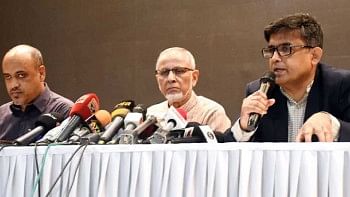The chief adviser's education promises
DR. FAKHRUDDIN Ahmed, the chief adviser, addressed the inaugural session of the conference on Governance in Education on Sunday, March 2, at the Shapla Hall of the International Conference Centre at the Chief Adviser's Office. He provided important guidelines for educational priorities, especially at the pre-tertiary level.
This is the first time that the head of the current government has spoken on key education issues. His comments and ideas have major implications for national education policy and strategy. The finance adviser, Dr. A.B. Mirza Azizul Islam reaffirmed the need for reforms at the concluding session of the conference on March 4.
The pertinent question is what the government, especially the two ministries of education, are going to do about what the chief adviser said. The main points in his speech, posted on the website www.cao.bd.gov, are the following.
-Great differences have emerged in the quality of education in urban and rural areas and for children of the rich and the poor. Segmentation and division in the education system have created a divided society.
-We have to ensure that a set of core knowledge and competencies are acquired by all students, along with choices for additional/complementary learning options. This calls for a core curricular content and objectives irrespective of the type of institution and provider of service.
-National commitment to "offer free and compulsory education to all boys and girls" as stated in Article 17 of the Constitution, and the MDG and EFA goals for 2015 will remain unrealized at the present rate of progress.
-Well-known NGOs in Bangladesh, which have pioneered internationally acclaimed innovations in preschool, primary, and secondary education, constitute a major "social capital" for our national development, which must be used to achieve national education goals.
-All service providers in a geographical unit, such as the upazila -- be they government education authorities, NGOs, or community organisations -- should work together through a mechanism of local coordination to ensure that every child can participate in an institution which meets minimum agreed standards of quality instruction, whoever provides the service.
-Non-governmental and community organisations can serve as the intermediary between the public education services and the community and parents to bring all stakeholders together. Educational institutions then can become truly responsive and answerable to the community and the parents. The local government institutions, as they become stronger, can play a more direct role than at present in this process.
-Community, voluntary and non-governmental organizations and the private sector need to be encouraged and supported to create and manage community learning centres, ICT centres and education programs for youth and adults as the building blocks of a "learning society."
-Vocational and technical education opportunities at the post-primary level should be increased substantially. Participation in skill development of youth who do not continue in formal education has to be raised manifold to prepare young people for the world of work. New models of effective and high quality vocational and technical education need to be designed which are responsive and adaptable to changing market demands.
-Successful experience elsewhere shows that the government should focus on policy-making, regulatory framework for standards, and overall planning to promote public-private collaboration in provisions for market-responsive vocational and technical education.
-Critical educational policy decisions and choice of priorities should be made transparently with ample public dialogue and the opportunity for review by stakeholders. An institutional consultative mechanism mandated to review and provide policy directions on a regular basis can be an effective vehicle for public scrutiny and continuity of policy.
-An importnat step in utilising ICT resources for education would be to make a BTV channel available for educational use, for which the infrastructure largely exists. This channel can be used optimally and effectively for high priority purposes, such as, teacher training and support, literacy and continuing education, supplementing formal primary and secondary classroom instruction, Open University courses, English language instruction, and so on.
-The content and the delivery of the different programs can be the responsibility of concerned education service providers, including non-government ones. The Ministry of Information and the two ministries in education should move expeditiously to create the new facility.
-A little over two percent of GDP is being devoted at present to education as public resources. This ratio needs to double within the next decade and the share of government spending for education needs to increase proportionately from the present level of under 15 percent. This investment is necessary to fulfill the aspirations in education. But good governance must ensure that the increased resources are used effectively and efficiently.
Some 80 participants attended the three-day conference, organized by Unesco in co-operation with the ministries of education and primary and mass education, with substantive input from the Institute of Educational Development, Brac University and the Access to Information Program at the Chief Adviser's Office.
They welcomed and endorsed the statement as an important guideline. They recognised that several ministries and agencies besides the two education ministries need to work together to initiate and facilitate follow-up of the guidelines contained in the statement. They adopted a "framework of action." which urged that a task-force with the lead taken at the Chief Adviser's Office be formed for this purpose.
The two advisers, respectively for primary and mass education and secondary and higher education, Ms. Rasheda K. Chowdhury and Dr. Hussain Zillur Rahman, arguably have the best possible credentials for their positions. The expectations from them and the teams they lead in the two ministries are, therefore, high.

 For all latest news, follow The Daily Star's Google News channel.
For all latest news, follow The Daily Star's Google News channel. 



Comments